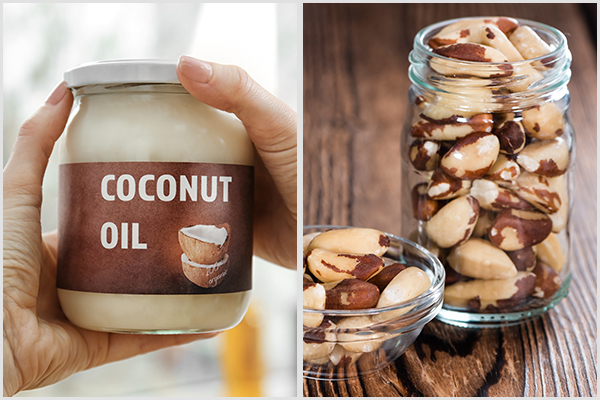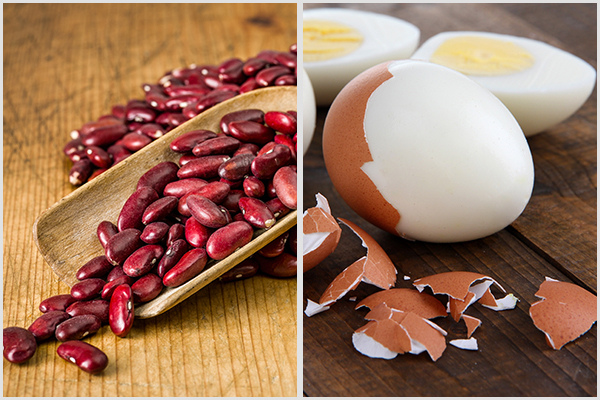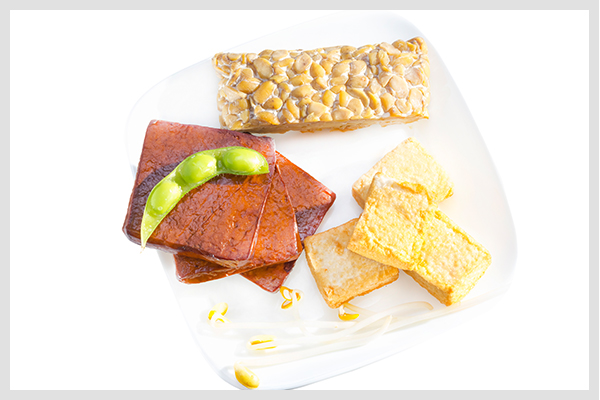In this article:
Hypothyroidism, also known as underactive thyroid or low thyroid, refers to a condition in which the thyroid gland is not able to make enough hormones to keep the body running normally.

The activity of this small, butterfly-shaped gland located at the base of your front neck affects a variety of systems in the body. The hormones produced by this gland (TSH, T3, and T4) are essential for the body’s growth, repair, and metabolism and regulate your mood, energy levels, body temperature, heart rate, and blood pressure.
When these hormones are in short supply due to a below-par thyroid function, the organs of the body do not get the adequate energy to keep them operating at the optimal level, and thereby the various body functions begin to slow down.
Foods That Help Treat Hypothyroidism
Here are 10 foods to improve an underactive thyroid.
1. A handful of Brazil nuts
Selenium is an important mineral for proper thyroid functioning. It protects the thyroid from inflammatory by-products of hormone production. It’s also necessary for proper active thyroid hormone conversion.
Selenium also yields antioxidant benefits, in that, it protects the thyroid gland from the oxidative damage caused by free radicals.
A 2015 study published in the Journal of Clinical Endocrinology and Metabolism notes that low selenium intake is associated with an increased risk of thyroid disease. Conversely, an increased selenium intake may mitigate your chances of developing this condition. (1)
The best source of selenium is Brazil nuts. A 2008 study published in the American Journal of Clinical Nutrition states that eating only two Brazil nuts a day on a regular basis can significantly improve your overall selenium status. (2)
Moreover, simply including this high-selenium food in your diet could prevent the need for additional fortification or supplementation of selenium. This is further compounded by the fact that Brazil nuts are a rich source of the amino acid L-arginine, which can help you reduce weight.
How to consume:
You can eat a handful of Brazil nuts as a healthy snack or include a few in salads or stir-fries.
Note: The use of selenium supplements is associated with its fair share of detrimental side effects and is therefore not recommended. So, if you do feel the need to take a selenium supplement, always run it by your doctor first as excessive selenium intake can prove to be toxic.

2. Use coconut oil for cooking
Coconut oil contains healthy medium-chain fatty acids that help people suffering from hypothyroidism by managing its associated symptoms, including weight gain. (3)(4) These fatty acids stimulate thyroid hormone production and thereby keep the thyroid gland functioning normally.
How to use:
- Replace your regular cooking oil with extra-virgin coconut oil.
- In baking, you can use coconut oil in place of butter.
- You can also consume 1 to 2 tablespoons of extra-virgin coconut oil daily by adding it to your milk, tea, hot chocolate, or smoothie.
Note: Do not consume more than 3 tablespoons of coconut oil a day.
3. Eat vitamin D-fortified foods
Vitamin D deficiency is often linked to Hashimoto’s disease, one of the most common causes of hypothyroidism. Most people tend to run low on vitamin D as it is very difficult to derive adequate amounts of this essential nutrient from foods alone.
A 2013 study published in Endocrine Practice reports that insufficient vitamin D has a potential role in the development of Hashimoto’s disease and/or its progression to hypothyroidism. (5)
Vitamin D-fortified milk is well endowed with calcium, protein, and iodine along with the added vitamin D, which is a boon for your thyroid as well as overall health.
Another excellent example of a vitamin D-fortified food is yogurt. Probiotic yogurt not only provides the needed doses of vitamin D but also helps maintain the balance of “good bacteria” in the gut. Thus, it is useful in alleviating certain digestive symptoms associated with Hashimoto’s disease, such as heartburn.
How to consume:
Aim to eat at least 1 cup of yogurt daily or other vitamin D-fortified foods such as 1 cup of low-sugar orange juice.

4. Add salmon fish to your diet
Salmon is one of the best fishes that you can eat for your thyroid health and metabolism. It boasts significant anti-inflammatory properties, due to its rich omega-3 fatty acid content. Numerous studies document the health benefits of salmon.
A 2010 study published in the Journal of Nutritional Biochemistry suggests that fatty acids signal and stimulate thyroid cells in the liver to burn more fat. (6)
A 2014 study published in Acta Physiologica Hungarica reports that omega-3 fatty acids could be useful as a neuroprotective agent against cognitive impairment stemming from hypothyroidism. (7)
In addition, omega-3 fatty acids lower the risk of heart disease, another side effect of unmanaged hypothyroidism, by managing the LDL or bad cholesterol levels.
How to consume:
- As most of the salmon varieties sold in the United States are farm raised, which are contaminated with PCBs (polychlorinated biphenyls) and mercury, it is recommended to consume wild salmon.
- When making a purchase, check for the label that clearly indicates that the fish is “wild”.
- Eat it at least twice a week.
5. Include seaweed in your diet
To help your thyroid gland function properly, iodine is extremely necessary. Iodine antecedes the production of thyroid hormones by attaching itself to the amino acid tyrosine to form thyroxin, which is essential for your thyroid to function properly. (8)
Although the body only needs traces of this mineral for the optimal functioning of the thyroid gland, an inadequate level can significantly inhibit the production of metabolism-regulating thyroid hormones.
To get your daily dose of iodine without increasing your salt intake, seaweed is one of your best options. This sea vegetable is also packed with other nutrients, including calcium, fiber, protein, phosphorus, magnesium, selenium, manganese, iron, and vitamins A, B, C, E, and K. (9)
How to consume:
- You can use seaweed in sushi, soups, and salads.
- Seaweed snacks are also available in the market, which works as a healthy low-fat alternative to chips.
Note: If you have autoimmune thyroid problems, such as Hashimoto’s disease, avoid seaweed and other sea vegetables in excess amounts, which may worsen your condition.
Also, because you tend to get your fill of iodine from your dietary intake alone, the use of iodine supplements to treat hypothyroidism is often discouraged. Excessive amounts of iodine in the body can prove counterproductive and end up causing further damage to your thyroid gland.

6. Eat brown rice
People who have hypothyroidism often crave carbohydrates more than other types of food. This happens due to a decrease in the neurotransmitter serotonin. Carbohydrates help raise serotonin levels.
In addition, carbohydrates have a direct effect on thyroid function as insulin is needed for the conversion of the inactive T4 hormone into the active T3 hormone. Insulin is found to be quite low among people following a very low-carbohydrate diet.
It’s important to eat healthy carbohydrates, such as brown rice. Being rich in complex carbohydrates, brown rice helps ease digestion and promote bowel movements, alleviating common digestive problems faced by people who have hypothyroidism. (10)(11)
It also helps increase energy levels, while reducing and normalizing blood sugar levels.
Note: Brown rice is rich in fiber, which can interfere with synthetic thyroid hormones. It is recommended to take your thyroid medication a couple of hours before or after eating foods rich in dietary fiber.
7. Eat kidney beans
Eating beans, especially kidney beans, may help boost your thyroid function.
Kidney beans contain a good amount of the mineral iodine along with other essential nutrients, such as protein, copper, potassium, calcium, and folate, that help maintain thyroid health and promote hormone production. (12)
Beans also serve as an inexpensive food choice that gives you sustained energy. Being rich sources of fiber, beans are effective in alleviating constipation, which is common among people who have hypothyroidism.
How to consume:
- Enjoy ½ cup of kidney beans, 3 or 4 times a week, by adding them to soups, salads, or stews.
- Always soak kidney beans in water overnight and toss the water before cooking.

8. Add eggs to your daily diet
Eggs are a good source of three of the most important nutrients that the thyroid gland needs to function properly – tyrosine, iodine, and selenium. A deficiency of any of these nutrients can cause thyroid problems. (13)
Eggs are also a good source of protein. Without adequate protein, the thyroid cannot function properly, even if you are taking thyroid medication.
This versatile, healthy food also supplies the body with vitamins A and D, zinc, calcium, antioxidants, and more. (14)
How to consume:
- Eat 1 to 2 eggs daily.
- You can enjoy them as an omelet, boiled, or scrambled.
9. Consume oysters
Oysters are one of the best dietary sources of zinc, a mineral needed for healthy thyroid function. Zinc aids in the conversion of T4 to T3 in people with low T3 levels and helps in the normalization of TSH levels.
A 2013 study published in the International Journal of Trichology notes that zinc deficiency may contribute significantly to the development of hypothyroidism. (15)
Additionally, symptoms such as depression, taste acuity, loss of appetite, skin lesions, and hair loss can improve with zinc supplementation.
Oysters are also rich in vitamin D, another nutrient that people with hypothyroidism run low on.
How to consume:
- Oysters can be eaten raw, smoked, boiled, roasted, canned, steamed, or broiled.
- Care should be taken when consuming raw oysters, as they may contain bacteria.

10. Chicken for a healthy thyroid
Chicken can be a good source of protein for people suffering from hypothyroidism. This animal protein source contains a good amount of amino acids, especially tyrosine, which is the building block of thyroid hormones.
In addition, the vitamin A found in chicken liver plays a key role in nursing a sluggish thyroid back into action and optimal health.
How to consume:
- Opt for organic chicken breasts to ensure a high-quality source of protein.
- Chicken soup or grilled chicken makes a healthy dinner or lunch.
- Even sauteed chicken liver, 2 or 3 times a week, is a good option.
Causes of Hypothyroidism
- Hashimoto’s thyroiditis is an autoimmune disorder that is the most common reason behind an underactive thyroid. In this condition, the immune system produces antibodies that attack the healthy tissues of the thyroid gland and trigger chronic inflammation. Although the exact cause for this autoimmune response is yet undetermined, it can be traced back to a number of factors, including your genes and environmental triggers.
- People with an overactive thyroid or hyperthyroidism undergo a treatment to bring down and normalize their hormone production. Radioiodine ablation treatments, in particular, to treat hyperthyroidism can end up reducing your hormone production to such a severe extent that your thyroid hormone levels become permanently low.
- Partial or complete thyroid removal surgery to treat problems such as thyroid cancer can diminish or cease the production of thyroid hormones, resulting in permanent hypothyroidism.
- In the same vein, radiation therapy or the treatment of cancer of the head or neck, lymphoma, or leukemia can hamper your thyroid function leading to hypothyroidism.
- Certain medications, such as lithium which is used to treat psychological disorders, can interfere with the normal functioning of the thyroid gland and cause it to become underactive.
- Some babies are born with congenital thyroid defects or with no thyroid gland at all.
- The hypothalamus is responsible for sending signals to the pituitary gland to make thyroid stimulating hormone (TSH), which spurs the thyroid into action to produce thyroid hormones. Certain medical conditions, including a benign tumor, infection, sarcoidosis, and cancer, can disrupt this chain of command and prevent the signal from reaching the thyroid gland. Thus, even though the thyroid is perfectly able to produce hormones, it doesn’t get the message to do so, leading to secondary hypothyroidism.
- Some women, during or after pregnancy, tend to develop this condition as their bodies start producing tissue-attacking antibodies that target their thyroid gland and cause it to become inflamed. Although the hormone levels generally return back to normal sometime after delivery, if the problem is left untreated during the gestation period, it can increase the risk of miscarriage, preeclampsia, and premature delivery and adversely affect fetal development as well.
- Because tiny amounts of iodine are essential to the production of thyroid hormones, a deficiency of this mineral can cause hypothyroidism, whereas an excess can aggravate the condition in people who already suffer from it.
Although this problem is not exclusive to any particular gender or age group, the most common victims of this condition are women and people over the age of 60.
Signs and Symptoms of Hypothyroidism

Some signs and symptoms of an underactive thyroid include:
- Constant fatigue
- Sudden weight gain
- Inability to lose weight
- Increased sensitivity to cold
- Decreased heart rate
- Constipation
- Extremely dry skin
- Puffy face
- Hoarseness
- High blood cholesterol levels
- Pain, tenderness, or stiffness in the muscles
- Heavy or erratic menstrual periods
- Depression
- Joint pain
- Thinning hair
- Impaired memory
- Enlargement of the thyroid gland or goiter
The signs and symptoms may be mild in the beginning, but as your metabolism continues to slow, they become more noticeable over time.
When to See a Doctor
If you suspect you have an underactive thyroid, it’s important to get tested by a practitioner. It’s also important to rule out Hashimoto’s thyroiditis, an autoimmune disease that is the number one cause of an underactive thyroid.
Treatment of hypothyroidism with synthetic thyroid hormones is a simple, safe, and effective option. However, certain foods can also help improve thyroid health and boost the effectiveness of your metabolism.
Expert Answers (Q&A)
Answered by Mr. Jonathan Valdez (RDN)

Hypothyroidism occurs when the body isn’t producing enough of the thyroid hormones, which control our growth, repair, and metabolism. This causes those with hypothyroidism to experience a multitude of symptoms, including fatigue, weight gain, hair loss, depression, and many more.
Although food cannot cure hypothyroidism, it plays a big role in managing the disease, and some foods are going to be necessary to avoid. Specifically, there are several nutrients that could potentially harm an individual living with this condition. For example, goitrogens may interfere with the regular functioning of the thyroid.
Foods that include goitrogens are actually more abundant than one may think. For example, soy foods (tofu, edamame, tempeh), certain veggies (cabbage, broccoli, kale, cauliflower, spinach), fruits and starchy plants (sweet potatoes, cassava, peaches, strawberries), and some nuts and seeds (millet, pine nuts, peanuts) actually contain this nutrient.
Essentially, those suffering from hypothyroidism should avoid goitrogens. However, studies have only really shown this to be an issue for individuals with an iodine deficiency or those who consume large quantities of this nutrient. Those with hypothyroidism should also avoid gluten as it can cause inflammation, worsening the condition.
Unfortunately, due to slow metabolism, it can be very easy for those with this condition to pack on the pounds.
The best way to lose weight or to maintain a healthy body weight for an individual with hypothyroidism is to get plenty of sleep, practice mindful eating, control portion sizes, try eating a moderate carb diet, and exercise regularly. As you can see, the recommendations for those with hypothyroidism are very similar to basic weight management tips.
Coffee is not necessarily good for this condition as it has been known to irritate the thyroid gland.
Many studies stress the importance of maintaining a healthy microbiome in order to boost your thyroid. The microbiome refers to the population of bacteria in our bodies that mainly live in our digestive tract. These bacteria are crucial when it comes to maintaining the intestinal barrier and keeping our immune systems strong.
When our microbiome is off-kilter, the intestinal wall is more likely to become leaky, and this can lead to inflammation and a cycle of immune activation that can greatly suppress our thyroid. Fermented foods such as sauerkraut, kombucha, miso, etc. can greatly aid our microbiome.
Some other theories involving boosting our thyroids include minimalizing stress, getting plenty of sleep, eating a healthy balanced diet, and getting adequate vitamin D.
A person with hypothyroidism is going to make sure they are getting adequate iodine, selenium, and zinc in their diet. Iodine is essential in the synthesis of thyroid hormones, which are crucial for a healthy thyroid. Selenium helps with the activation of the thyroid hormones so they can readily be used by the body.
Zinc activates the thyroid hormones as well, but also helps the body regulate TSH, the hormone that signals to the thyroid gland to release the thyroid hormones.
Hypothyroidism is most commonly caused by an autoimmune disorder called Hashimoto’s disease. In Hashimoto’s disease, the immune system causes the thyroid gland to decrease the amount of hormones it produces, and this can be hereditary.
Final Word
Get plenty of sleep, exercise regularly, pay attention to the nutrients you should eat more of and those you should avoid, control your portion sizes, and eat plenty of fruits and veggies! Make sure your diet is rich in iodine, zinc, and selenium.
- Was this article helpful?
- YES, THANKS!NOT REALLY


